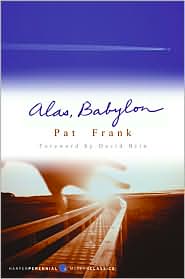 Classics is a little thing I started where I talk about classic novels (or older novels that have no need of being reviewed in this day and age). I do not necesarily review the books, just give my opinion, and talk about why they're important, whether I enjoyed them or not.
Classics is a little thing I started where I talk about classic novels (or older novels that have no need of being reviewed in this day and age). I do not necesarily review the books, just give my opinion, and talk about why they're important, whether I enjoyed them or not.Pat Frank's Alas, Babylon isn't necesarily a "classic" novel. It was first released in 1959, and had one small televised adaptation. It may not be To Kill a Mockingbird or a novel of many awards, but it has an effective focus: Nuclear war. Randy Bragg, the main character, amongst others in the small surviving Florida community located in Fort Repose, must find a way to survive in what seems to be their abandoned little world, without technology or working government. They must overcome sickness and hunger, as well as deal with the death that surrounds, for most of the United States and its allies were bombed.
I had to read Alas, Babylon by Pat Frank for school, and I doubt if I would have picked it up otherwise. War tends to be an interesting subject to read about when it has something to do with science fiction or fantasy-based, but realistic fiction can be sort of scary for me, a peace-person. I can only hope that something so tragic, so horrible, will not happen in reality.
Though I cannot relate to any of these particular characters, I have empathy for them. Randy feels the pressure of leadership, others don't know if their family or spouse is still live. Children are afraid, and boys are forced to be men in little time - like Ben Franklin, Randy's nephew. I felt almost... uncomfortable at the thought with a gun in his hand. He handled things in such a mature way, and adapted to the situation.
Of course, the theme of survival can be a page turner. It can also be slow, filled with waiting with small dilemmas in between. Food was a big part in this. What happens when it runs out? What are we smart enough to remember? How creative can we get? Foods that I didn't understand the value of ended up being so important to the characters. Pat Frank wrote with purpose, and he also wrote at a good pace. Sure, sometimes he jumped foreward a lot with the timeline, with gaps in between, but if he didn't do this (which can oftentimes seem randomized) the novel would have taken forever for me to get through. At times, it could seem a bit tedious, and I felt like problems were solved almost as soon as they were introduced.
The ending isn't ideal, and I've only read one other book with such a feel. The community manages their problems, yet the situation remains bleak to some degree, for not much is really solved. However, there is a lingering hope. And that's what this whole book is about. Humanity will adapt and continue, and hope is present in even the darkest hours of a nation.
Alas, Babylon had a lot going for it, and it had quality. In my opinion, it should have received more praise than it had when it was first released, although I'm not particularly crazy about it. It's a good book, I'll give it that. But it's not exactly one of my favorites.
3.5/5 Stars
No comments:
Post a Comment